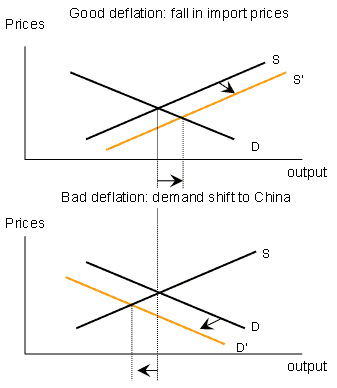In recent years, China's remarkable progress in industrialization has been regarded as a major cause of deflation in Japan, and Japanese financial authorities are calling for a stronger yuan to solve this problem. However, if we consider the fact that Japan's imports from China amount to only about 1.5 percent of gross domestic product and that there is very little competition between the two countries on the trade front, it is clear that any decline in prices in China has only a limited impact on the Japanese economy. In fact, the rate of inflation - or, to be more accurate, deflation - in China is about the same as in Japan, and if China is to be called the cause of deflation in Japan, the reverse also applies.
For the sake of argument, even if we were to assume that deflation in China is accelerating deflation in Japan, is this really problematic? To answer this question, we need to make a distinction between whether the fall in prices of Chinese goods results in "good deflation" that accompanies an increase in output, or "bad deflation" that brings about an output decline.
Needless to say, the focus of the Japanese media has been on the "bad deflation" scenario. In other words, when China's exports get cheaper, they reduce the market shares of Japanese products not just in Japan, but also in third country markets. Shown in the framework of supply and demand, this situation means that Japan's demand curve shifts to the left ( diagram ). In terms of the effect on prices, this is deflationary, and it also has a negative impact on Japan's output.
However, if Japanese firms import various parts and intermediate goods from China, cheaper import prices means that production costs decrease, leading to "good deflation." When we think in economic textbook terms, the supply curve corresponds to the marginal cost curve, and cost reductions brought about by importing cheaper products from China shifts Japan's supply curve to the right, and as a result, output increases even if prices fall.
But the conclusion as to which type of deflation has greater impact on Japanese output differs depending on whether the economic relationship between Japan and China is viewed as being competitive or complementary. If the two economies are seen as being in a competitive relationship, then the impact on the demand side is greater, with a negative effect on output. If the economies are viewed as complementing each other, there is a greater impact on the supply side, with a positive effect on output. In fact, it is obvious that the two economies are in a complementary relationship as Japan's exports are mainly high-tech goods while China's exports are concentrated in low-tech products. Thus "good deflation" is likely to dominate "bad deflation" so that the overall impact on output should be a positive one. For the same reason, even if an appreciation of the yuan reins in deflation, demand will not shift that much from Chinese goods to Japanese goods, and rather, there is a great possibility that output will fall due to the rise in import costs.
I must add that the above analysis is based on the position of Japanese producers, and from the consumer's point of view, there is no need to distinguish between good and bad deflation. The fall in prices of China's imports, as in the case of a fall in oil prices, signifies an improvement in the terms of trade, and a rise in real income of consumers. Conversely, a stronger yuan means that imports from China will become less affordable to Japanese consumers.
As this shows, it must be said that both the therapy that attributes the cause of deflation in Japan to the rise of China and the prescription that a stronger yuan will solve the problem are wrong. So long as the real reason behind Japan's deflation is the delay in structural reforms and the protracted domestic economic slump that accompanies it, Japan's economy will not see a real recovery unless these problems are solved, no matter how strong the yuan becomes.
Diagram : The China factor in Japan's deflation



